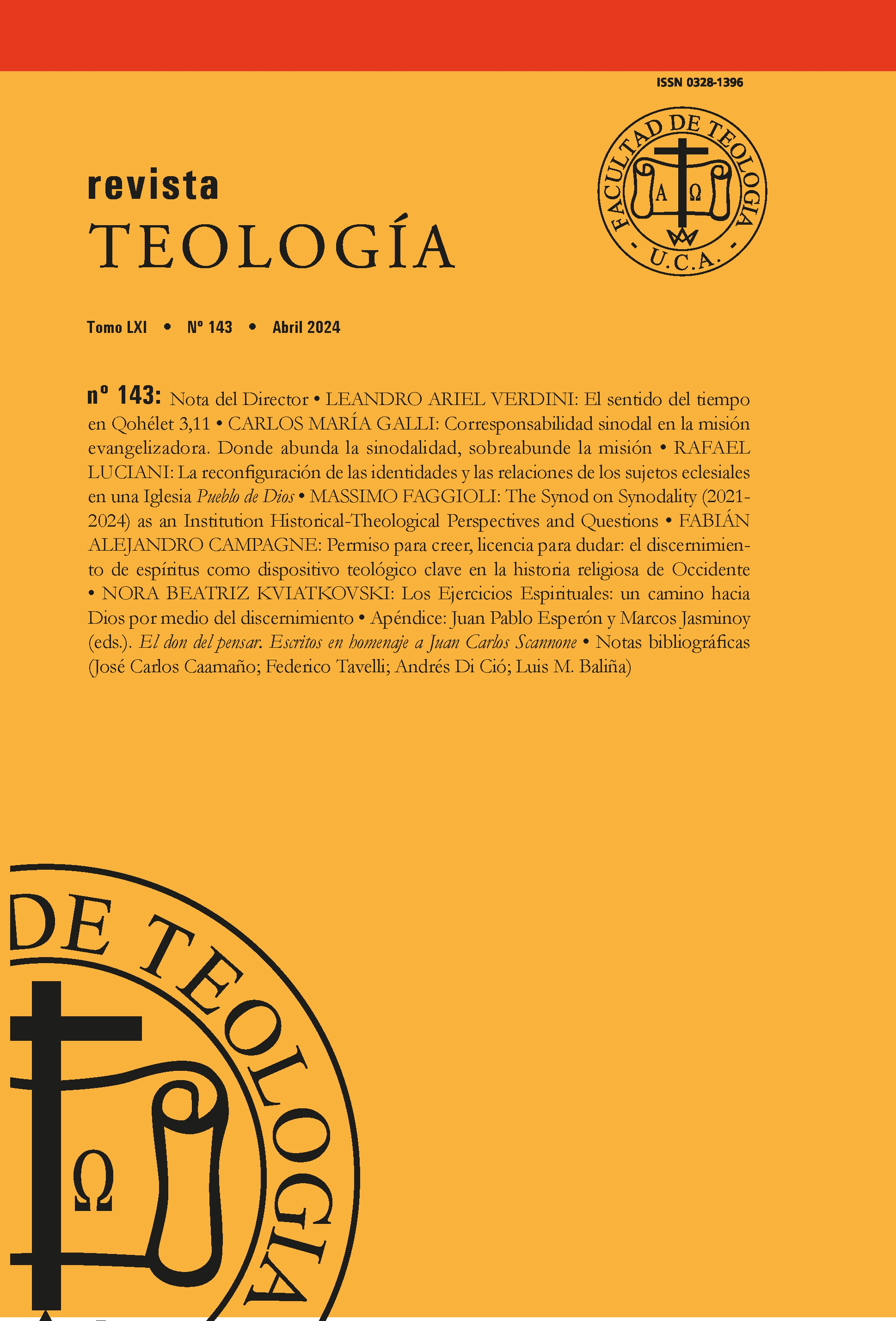The Sense of Time in Qoheleth 3,11
DOI:
https://doi.org/10.46553/teo.61.143.2024.p9-27Keywords:
Qoheleth or Ecclesiastes, The Time, Sapiential Anthropology, Ratzinger’s Eschatology, Pedro FabroAbstract
The human being today, drowned by consumption and at the same time suffocated by agendas filled with activities and demands, tends to avoid discerning within himself the fragility of his existence and confronting them with his impulses and desires. Profound intuitions that come from the innermost part of the heart are often ignored, and it is these intuitions that awaken the desire for God, generally because of an apparent lack of time, or rather, because God is seen as a loss of time. In the book of Qoheleth, among the many themes and issues that illuminate human existence, a challenge is presented to the contemporary reader in 3:11: What did God place in the human heart? This is a mysterious crux interpretum, and it is not easy for readers to elucidate and interpret what the given thing was. Like the wise man, we set out to investigate (cf. Qo 1:13) in detail these words of 3:11 to revisit them and rethink the meaning of time.
Downloads
References
Agustín de Hipona, De Trinitate. https://www.augustinus.it/spagnolo/trinita/index2.htm
Anaya Luengo, Pedro. El hombre destinatario de los dones de Dios en el Qohélet. Salamanca: Publicaciones Universidad Pontificia, 2007
Bonora, Antonio. El libro de Qohélet. Madrid: Ciudad Nueva, 1994
Dahood, Mitchell. «Canaanite-Phoenician influence in Qohelet», Biblica 33 (1952): 191-221
Delitzsch, Franz. Commentary on the Song of Songs and Ecclesiastes. Edinburgh: T&T Clark, 1891
Évagre le Pontique. Scholies à l'Ecclésiaste. Tr. Paul Géhin. Sources Chrétiennes 397. Paris: Cerf, 1993
Fabro, Pedro. Memorial. Buenos Aires: Ediciones Diego de Torres, 1983
Gil, Fernando. «“El tiempo es el mensajero de Dios”. Esbozos para una teología de la historia del Papa Francisco». En Sociedad Argentina de Teología. En el camino de Emaús. Esperanza que fecunda la historia. Buenos Aires: Ágape libros, 2017
Gregorio de Nisa. Homilías sobre el Eclesiastés. Tr. Ramón Cornavaca y Octavio Peveraro. Madrid: Ciudad Nueva, 2012
Han, Byung-Chul. El aroma del tiempo. Un ensayo filosófico sobre el arte de demorarse. Barcelona: Herder, 2015
Murphy, Roland. «The Pensees of Coheleth», The Catholic Biblical Quarterly 17 (1955), 184-194
Murphy, Roland. Wisdom Literature. FOTL XIII. Grand Rapids: Eerdmans, 1981
Nicacci, Alviero. «Qohelet o la gioia come fatica e dono di Dio a chi lo teme», Liber Annus 52 (2002): 29-102
Pontificia Comisión Bíblica, ¿Qué es el hombre? Un itinerario de antropología bíblica. 2019
Ratzinger, Joseph. Escatología. La muerte y la vida eterna. Barcelona: Herder, 2007
Ruiz, Eleuterio Ramón. El libro del Eclesiastés. Comentario y propuestas de lectura. Estella: Verbo Divino, 2023
Schoors, Antoon. Ecclesiastes. Leuven: Peeters, 2013
Vílchez, José. Eclesiastés o Qohélet. Estella: Verbo Divino, 1994
Watson, Wildred. Classical Hebrew Poetry. A guide to its techniques. London: T&T Clark, 2014
Downloads
Published
How to Cite
Issue
Section
License
Copyright (c) 2024 Leandro Ariel Verdini

This work is licensed under a Creative Commons Attribution-NonCommercial-ShareAlike 4.0 International License.


















 Teología
Teología